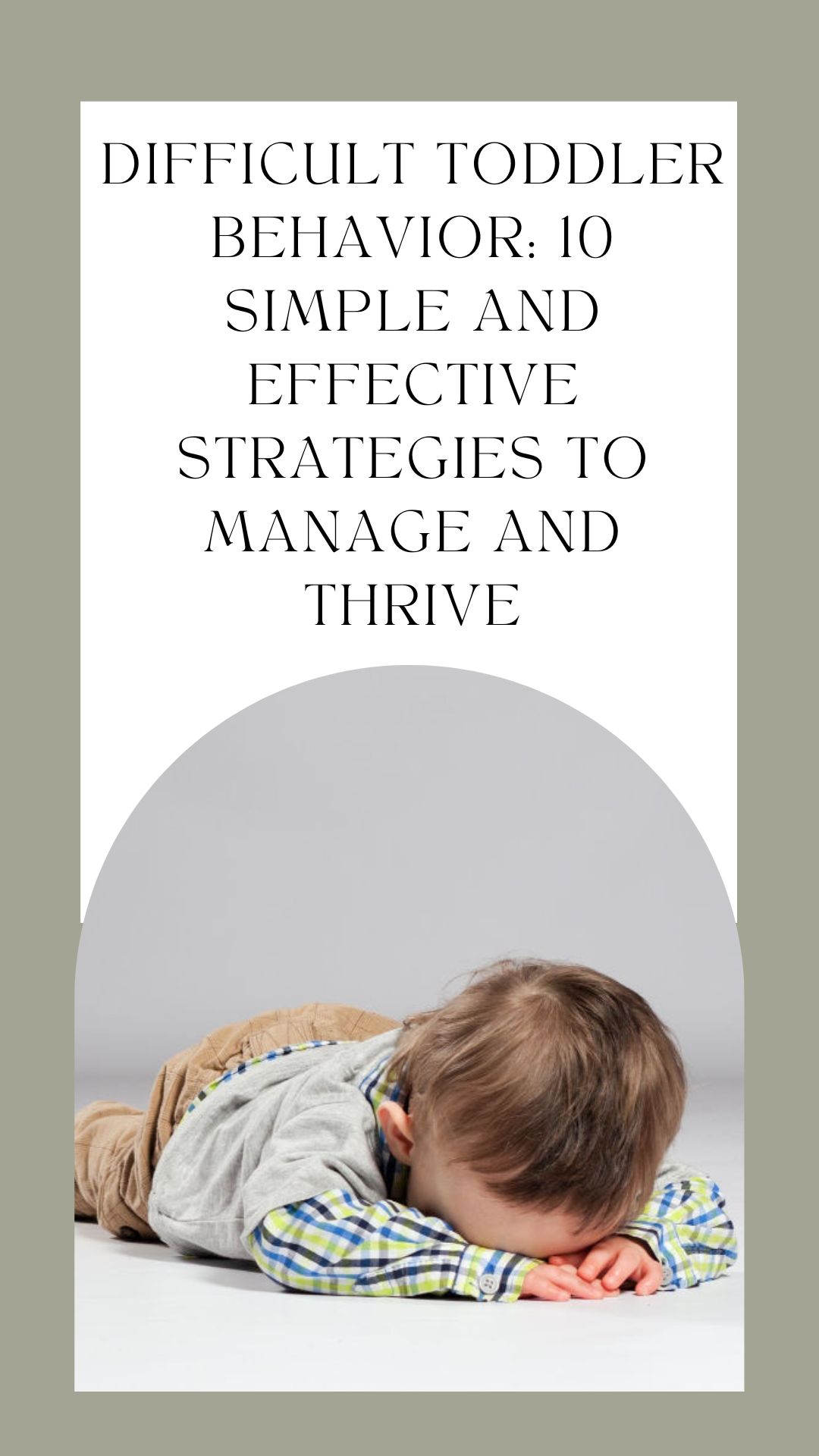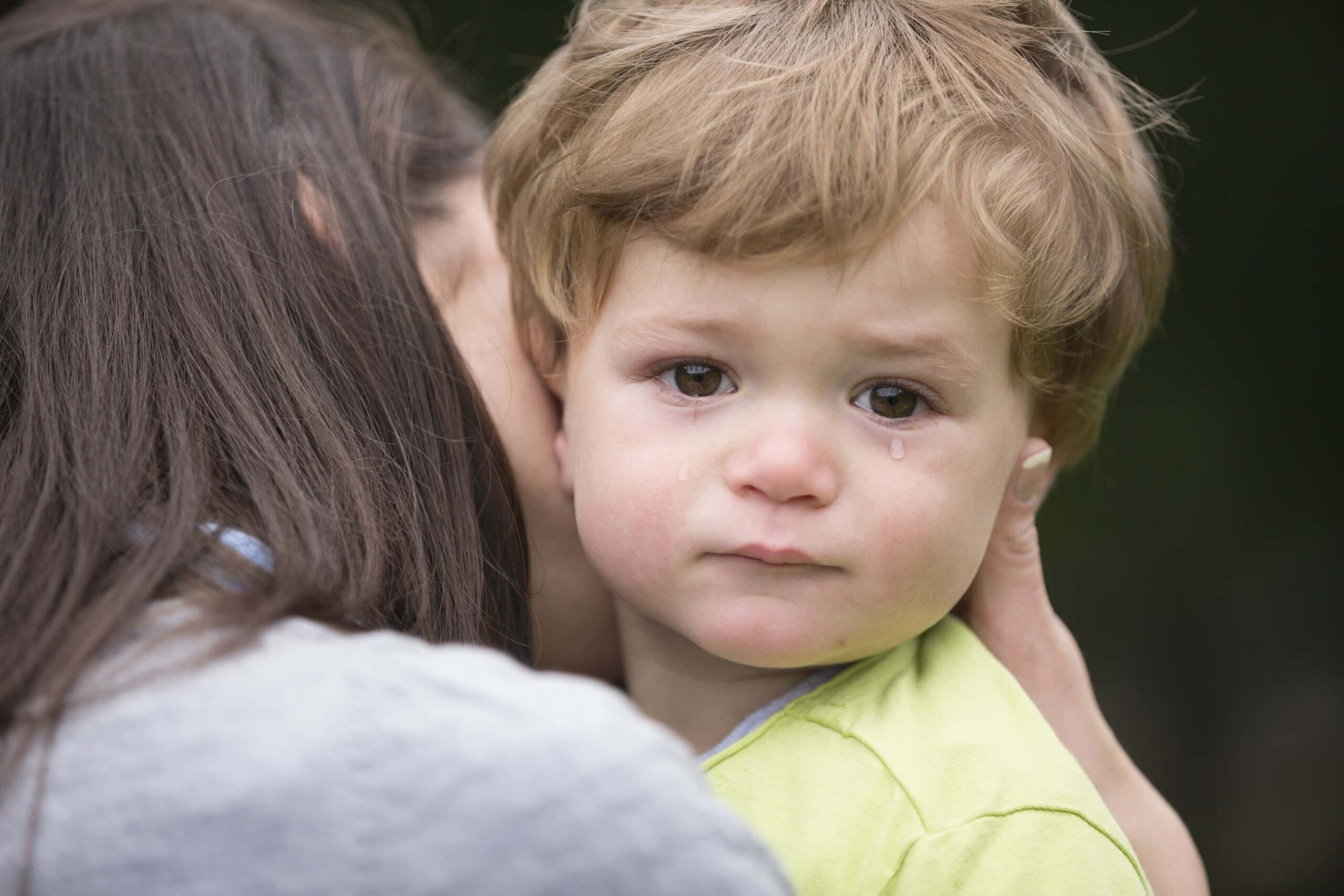Table of Contents
When you’re faced with difficult toddler behavior, it can be painful. You simply want to move forward with your day, yet your child is digging in his heels or throwing a tantrum. Find positive parenting tips that will mitigate meltdowns and willfulness.
I had just got back from my first yoga class in a minor eternity.
Having worked on handstand more than any other pose, I left feeling light, playful, and kiddish. The truth is since we moved three months ago, I hadn’t left the house without my kids. That one-hour yoga class felt like the ultimate recharge.
Capitalizing on my kid-free time, I decided to pick up all of the ingredients for a treat I had seen on Pinterest.
I had barely made it through our front door, sweaty and smiling, when I was met with a meltdown.
“You missed Mama?”
I scooped up my son.
He settled only to realize his sister had found the mini M&M’s in one of the bags I had brought in. I set him down and offered him the chocolate chips from the same bag. Incensed at this pathetic attempt at compensation, he lost all self-control and tried to swat them away. “Gentle touches, please. If you don’t want these why not ask if you can trade for the M&Ms?”
Now he was on the ground crying.
I brought him in my arms and hugged him. Crying persisted. Long story short, we ended up in his room for a calm-down time together and no candy apples were made. I could argue that he is in the process of getting his molars in. And, he just got a cold, but who am I kidding?! This kid turned two at the beginning of the summer and is definitely expressing his autonomy and upset in a shrill way.
Parenting toddlers through tantrums is no easy feat
One of my favourite developmental theories touches on this period of toddlerhood. Erik Erikson’s stages of psychosocial development offer a wonderful framework from which to see toddler tantrums, resistance, crying, and other difficult toddler behaviours. In a nutshell, toddlers want to express their independence from you, show their preferences, and demonstrate their will for the first time.
So when my toddler arches his back when getting into his car seat or insists on only drinking out of the red cup, he isn’t trying to push my buttons or be disobedient. Instead, he’s started to taste independence and wants to continue working on this skill. The desire to express autonomy can override all reason and self-control (to the point of tears and tantrums) but is developmentally appropriate and important.
That said, it certainly isn’t easy.
These tried and true positive parenting tips help work through those difficult toddler moments. They are based on psychology research and my experience raising two toddlers.
Related reading: This is why you shouldn’t punish tantrums and what to do instead
Positive discipline strategies for parenting toddlers

1. Set expectations by front-loading (letting them know expectations ahead of time)
Not only does this help set kids up for success because they know what is expected, but it also helps them make sense of potential discipline if their behaviour calls for it.
For instance, this past week, I took both kids to a children’s museum. Knowing my daughter loves to flit from station to station without warning and because I was there without another adult to track her, I told her beforehand that she had to say, “Changing Mama” before she went anywhere. When we got inside, I had to take her aside two separate times to remind her of the expectation. Due to our conversation before, she didn’t react to me stopping her play because she knew she had made a mistake. The rest of the afternoon she let me know before she changed stations.
2. Instead of saying no, offer alternatives
To give an adult example, imagine being at a restaurant and asking something like, “Do you have a whole wheat option?” and they answer “No.” It creates a much better experience if the server says something along the lines of, “We don’t but if you are looking for something healthier, you can have your sandwich in a lettuce wrap or substituting the bread for a side of rice.” The message is the same: they don’t have the option I was looking for but I’m not being shut down.
For young children, a parent might respond to a request for Oreos by saying, “You need to eat your dinner first.” Or, “We’ve already had a dessert today, but you can have Oreos tomorrow.”
Equally, if a child wants to wear a swimsuit to preschool, the parent might say, “Bathing suits aren’t for school. Let’s grab some cool shorts and a tank top instead.”
The message is the same. They can’t have Oreos or wear the bathing suit to school, but the message is easier to digest than a straight no.
3. Choose your battles
There are certain non-negotiables. For instance matters of safety like holding an adult’s hand while crossing the street, wearing a seatbelt, and sitting while eating are not up for debate. However other things like matching clothes, who clicks the seatbelt, and the occasional floor picnic at dinner time may have wiggle room.
You can’t expect good behavior all the time, no one behaves perfectly all the time. One way to avoid battles with your toddler is to recognize this and allow them to win the battle of wills once in a while. If it is something you can be a little flexible on, like some mismatched clothes, giving them that little bit of freedom will help diminish the constant tug-of-war.

4. Give two options with the same outcome
This is one of the simplest tips for parenting through difficult toddler behaviour. Giving two options with the same outcome makes a toddler feel in control. Meanwhile, you get them to agree to do what you would like done. For example, “Do you want to put on your shoes or have Mama put them on?” or “Would you like to clean up now or in two minutes?” Appealing to a toddler’s desire for autonomy can mitigate power struggles.
Related reading: Parenting a Strong-Willed Child? This is how to do it right
5. Give warnings and use a timer
To use an adult example again, imagine if you were out for dinner at a friend’s house having a blast and suddenly your spouse interrupts mid-conversation and says, “We are leaving now.” He or she then ushers you away from your friend and out the door.
The car ride home would likely be a poignant discussion if not an argument.
Likewise, kids do best when you preempt the end of fun with a warning. I find using a timer is the best indication of when to leave because it isn’t arbitrary. When I say, “One last slide,” my kids tend to put off that last slide for as long as imaginable.
6. Choose natural or logical consequences
Consequences that are a byproduct of their choices or are directly tied to them are shown to lead to better internalized moral reasoning. Natural consequences stem from the behaviour and aren’t imposed by the parent. For instance, when my daughter doesn’t want to wear her jacket, I suggest she stand on the porch for a few minutes. Each time she comes in and grabs her jacket. I follow with positive reinforcement to let her know she’s made a good decision.
Sometimes natural consequences are too risky and a parent must impose logical ones.
Examples include:
- running with scissors: loses the use of scissors
- hitting a child at the park: must sit to the side of the park for a timeout with mom or dad.
Related read: Consequences for kids: Why forcing kids to behave hurts more than it helps
7. Empathize & paraphrase
Feeling heard and understood is one of the most valuable gifts we can give our kids especially when they’re struggling and lacking self-control. So much of difficult toddler behaviour, or kids acting out in general, is simply them not having the words or the self-awareness to verbalize how they are feeling. In paraphrasing their feelings, they feel heard and can process their emotions more readily (read more from Child Psychologist, Dr. Laura Markham on this subject here). Paraphrasing also helps them develop the language to “use their words.”
8. Hug it out
When kids are screaming and crying, it may seem counterintuitive to hug them. Often they are just looking for a soft place to fall, unload, and feel safe. There are, of course, times when their tantrums are more physical and as a result, it’s better to give them space.
Sometimes, our kids just need some positive reinforcement to reset their behavior. They get stuck in the whirlwind of a meltdown and don’t know how to “fix it”. Giving them a hug lets them know you still love them, you’re still there, and you will work through this together.
Read: It’s science: Attachment is key to raising emotionally healthy children

9. If it’s not negotiable, don’t enter into negotiations. Disengage.
When you’ve set them up for success and you’ve given them a lot of empathy, and they still aren’t listening, remember not to negotiate. Sometimes it is best to simply state, “I have said we can’t read books right now because we’ve already read two and it’s now time to go to sleep. I know you’re sad. I am not going to talk about this anymore.” Entering into a power struggle will only make matters worse. As a last resort, take a timeout.
10. Get present and, if you can, get outside
More often than not, I have found that the most difficult behaviour arises when I’m preoccupied or rushed. Sometimes dropping or postponing what’s on my to-do list, being present and getting some fresh air solves everything. Being outside has a way of regulating both parents and children alike.
11. Wait it out
When possible, waiting for the emotional storm to pass can be the best course of action. Stay calm, take a deep breath, and simply wait. The crying will end and simply being there and loving a toddler through their big feelings is the quickest way through it.
In situations where time isn’t a luxury, parents can still help their toddlers work through their emotions. This may be something like scooping my son up, grabbing his shoes and saying, “I know you don’t want to wear your rain boots. It’s frustrating when you want to wear sandals. We have to go. It is upsetting. You can wear your sandals on the next sunny day.”
In conclusion

Toddlerhood isn’t easy. It is the first time in their lives that they have a taste of independence and, as a result, can be quite willful when they don’t get their way. They also lack the self-control required to reason logically through a situation, so it is hard for them to manage disappointment.
The best thing we can do is educate ourselves as parents on the intricacies of child development. Read books, listen to podcasts, talk with other parents. The good news is there are many positive strategies parents can put in place to mitigate tantrums and promote cooperation.
Like this post? Click on the image below to share this on Pinterest – Thank you!













Great tips! My son just turned two this past August so we are in the same stage. I do almost all of these with my son. I agree with you that setting expectations does wonders. I used this a lot while teaching. I have found that often times children misbehave because they don’t truly know what is expected of them (we just assume that they know). I also try to practice good behaviors, especially if we are going out somewhere. The only one I haven’t done yet is counting down. I think I might be worried about what would happen if I hit 3 and the behavior didn’t change. Even with all these strategies, toddlerhood can be a tough age! haha I’m learning as I go.
I’m WITH you!!!! It is so hard and it is so smart to set expectations. I can only imagine the implications in a classroom! Counting to three with my son does nothing except get me to follow-up with him. 9/10 with my daughter it works because she’s come to learn it’s much easier to do things on her own accord rather than have mama do it for her?
These are really great tips. With twin toddlers, since I am outnumbered, I find it even harder to control their behavior. They seem to feed off each other, or one will be behaving and the other will not. I love the setting expectations, and giving options other than just no. I’ve also tried hugging when tantruming, and it does seem to work. You’re “Don’t negotiate with Terrorists,” had me laughing out loud. So true!
Love all 10 tips! We count down from 5 a lot with our 4yo. It really helps prevent yelling.
These tips are spot on. My daughter just turned 3 and I hate to say it, but it just didn’t get any better yet. Terrible threes…or so I have heard. “No” is a really big deal in our house and we try to give options rather than say “no”. Redirecting is also huge as she tends to just get stuck on one thing and won’t stop (whether it is food, or clothes or whatever!) so we need to redirect her onto the next thing, like coloring or playing with the dogs or something else!
These are wonderful tips.I have two toddlers.. a one and a two year old. And I can say, I go a bit crazy at times with their behavior. The one year old is very much worse than my two year old with it though. I’m going to take some of this advice and see if it helps ease our days a bit more smoother.
I love the timer idea and need to add that in pronto! Thanks for these wonderful tips!
I love this whole list.. especially the offering two options.. that one always works for me.
Great tips! My daughter will be 2 in a few months and we are struggling with the tantrums right now.
I love these tips Alana!
Some that I try to use with my boys are setting the expectations and choosing consequences that fit the action. My youngest is told several times a day that he needs to use words instead of noises. Usually I can just tell him once and he will respond with words, other times it takes a little bit more work on my end. I also try to remind him to ask for help if something is frustrating him rather than start a fit.
Loving all of these tips! We try really hard to stop and take Deep breaths. I think I need those as much as she does!!
What great tips! Number 1 worked well with my daughter and so did number 10. I use that one at work all the time!
These are some great tips! My toddler is giving me a run for my money right now. Personally I am a huge fan of hugging it out and for Caleb it helps when we take deep breaths. Fresh air too. I have to admit, I found it a little strange that taking a quick step outside could calm him down in an instant. Anyway, these are awesome and just what I needed to read today.
I have two boys 3&4 18months apart and boy i tell ya they sure give me a hard time espeically my 3year old ,sometimes i just wanna cry they drive me crazy but at the end of the day they cuddle me and love on me it makes it all better 🙂
Thanks for these tips! Always good reminders and I like the timer idea 🙂
Great tips! I am a pre-K teacher of 4 and 5 year olds, so a lot of these I was using in my classroom already. My husband, being new to dealing with children, has to be reminded sometimes to give a direction and not ask a question. ( example: “Time to put your toys away” instead of ” Can you pick up your toys now?”) I find that not giving them the option to say no is helpful.
I also find that in the middle of a meltdown, I can usually turn things around if I start singing, dancing, or doing something funny. It distracts then long enough to be able to rationally listen again (as rationally as a toddler can listen!) My son will be 2 tomorrow and we’re going through some trying times with him now, but hoping to make it to the other side unscathed… To be closely followed by my daughter who is 2 months! God, give me the strength!
I have twin boys 14 months old and they are exhibiting terrible 2 behavior already. Which is very frustrating for me, because they really don’t talk yet. How can I discipline or “reason” them when they can’t express themselves clearly. L.M. shakes his head no when he doesn’t want to do something and has tantrums, L.J. is also very clear about what he likes or doesn’t like. My Problem is when they behave negatively how do I get them to understand without losing my cool.
Christine, I too find it difficult. For instance, my son SCREAMS when even the smallest thing is off to show how upset he is. For myself, I try and remind myself that a lot is beyond their developmental abilities. I also am honest with my kids about how I’m feeling, “Mama is getting very frustrated right now.” No matter what, it isn’t easy. And to be honest, I don’t know a parent who has never yelled or never struggled with feeling exasperated with parenting.
These are fantastic tips. I have used a lot of them in my past working as a preschool teacher. I especially like giving two options that have the same outcome. It gives the little one that sense of control that they crave! My own daughter hasn’t quite reached the toddler tantrum stage yet, but I have a feeling these tips will come in handy for us soon.
Great tips! I have actually told my son (he was clueless) I do not negotiate with terrorists. Haha!
Hahaha. It doesn’t register on mine either 😉
I do like no.7. I default to time out way to often. I’m going to try this later next time I turn into shouty mama!!
Rachel, I can relate. I default to tactics that don’t exactly work all that well when parenting through difficult toddler behaviour. Parenting isn’t easy especially when you’re tired and dealing with the same issue over and over. Thanks so much for reading!
Great one. Happy to read through all the instructions as each of them are the day to day issues the parents face. The special one is “Do not get into negotiation if it is not negotiable”. Liked the idea behind giving them two options. Thank you for sharing the great parenting tips.
Awesome hints Thank You!!
Im going to practise these as a Grandma!
I absolitely love these ideas. I try counting down from five with my 3 year old and then we talk through the problem. I’m attenpting it with my 1.5 year old but she doesnt understand it yet. I must remember the rest of these practices though.
Thank you so much for your comment about parenting your own toddlers. I love your strategies and I agree a 1.5-year-old is much more difficult to talk it out with. I have a fourteen-month-old and he’s very vocal 😉
Hi
I like the blog. Indeed, It will help parents to handle their toddlers tantrums. One should handle their child’s anger & tantrum very calmly & wisely, because our harsh behavior can impact on child’s growth. Even you can take help from parenting coach, they will help you to improve your parenting skills.
First of all, let me take this opportunity to say thanks to you for sharing such an informative article to Mitigate Difficult Toddler Behaviour. For a first time mother like me, this article is like an elixir for life. I got to know so much about dealing with my tiny toddler in an effective manner.
I am going to be a dad in next month , Thank you Alana for sharing such an helpful article about parenting . Many tips i have found which i have to follow for a better parenting . I found here for what i was looking for . .Really loved this amazing blog
Wow, so this is what is going to happen? I’m sleep training John right now and he’s starting having some weird tantrum-like moods lately. I hope sleep training (with this book I loved https://www.parental-love.com/shop/toddler-sleep-training ) will help somehow, at least in the evenings! Since I believe the over-tiredness is the main trigger for now.